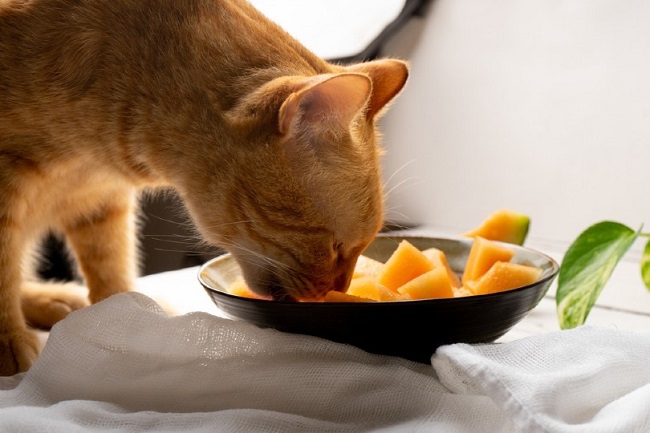As a cat owner, you’re no doubt always on the lookout for new and nutritious foods for your beloved feline friend. If you’re wondering, ‘can cats eat mango?’ you’ve landed on the right page.
In this comprehensive guide, we’ll delve into the safety, benefits, potential risks, and best practices when it comes to cats and this sweet tropical fruit.

Can Cata Eat Mango?
The straightforward answer to “can cats eat mango?” is yes, but in moderation. Mangoes are non-toxic to cats and can be a delightful treat for them occasionally.
Read Also:
However, it’s crucial to remember that cats are obligate carnivores, meaning their primary diet should consist of protein from meat.
Although they can consume some fruits and vegetables, these should not replace their primary diet but supplement it.
Benefits of Mango for Cats
Mangoes are packed with numerous nutrients beneficial for your cat. They are rich in vitamins A, B6, C, and E, dietary fiber, and antioxidants.
Vitamin A: Essential for maintaining your cat’s overall health, particularly their eyesight.
Vitamin B6: Supports the cat’s nervous system and helps metabolize fats and proteins.
Vitamin C: Although cats produce this naturally, additional vitamin C helps strengthen their immune system.
Vitamin E: Acts as an antioxidant, protecting your cat’s cells from damage.
Dietary Fiber: Although cats don’t need much, fiber can aid in their digestion and help prevent constipation.
Precautions While Feeding Mango to Cats
Despite the benefits, there are some precautions to consider:
Portion Size: Only give small pieces of mango to your cat, and remember it should be an occasional treat, not a staple food.
Remove the Pit: The mango pit is a choking hazard and contains small amounts of cyanide, which is harmful to cats. Always remove it before feeding.
No Peel: Mango skin can be hard for cats to digest. Always peel the mango before offering it to your feline companion.
Potential Risks of Feeding Mango to Cats
Although mangoes are safe, overfeeding can cause some problems, including:
Stomach Upsets: Cats have a sensitive digestive system, and too much of any fruit, including mango, can cause diarrhea or stomach discomfort.
Weight Gain: Mangoes, while nutritious, are high in sugar. Excessive consumption can lead to weight gain and related health issues.
Read Also:
Conclusion
In conclusion, the answer to “can cats eat mango?” is a resounding yes – with a few important caveats. Mangoes can provide nutritional benefits to your feline friend, but they should only be served in moderation and prepared carefully, keeping your cat’s primary dietary needs in mind.
Remember to always monitor your cat after introducing any new food to their diet, and when in doubt, consult with your veterinarian. Each cat is unique, and what works for one may not necessarily work for another.
With this comprehensive guide, we hope to have addressed all your concerns about cats and mangoes. By understanding the benefits and potential risks, you can make informed decisions about incorporating this tasty fruit into your cat’s diet. Hope now you know all the information about it.
























